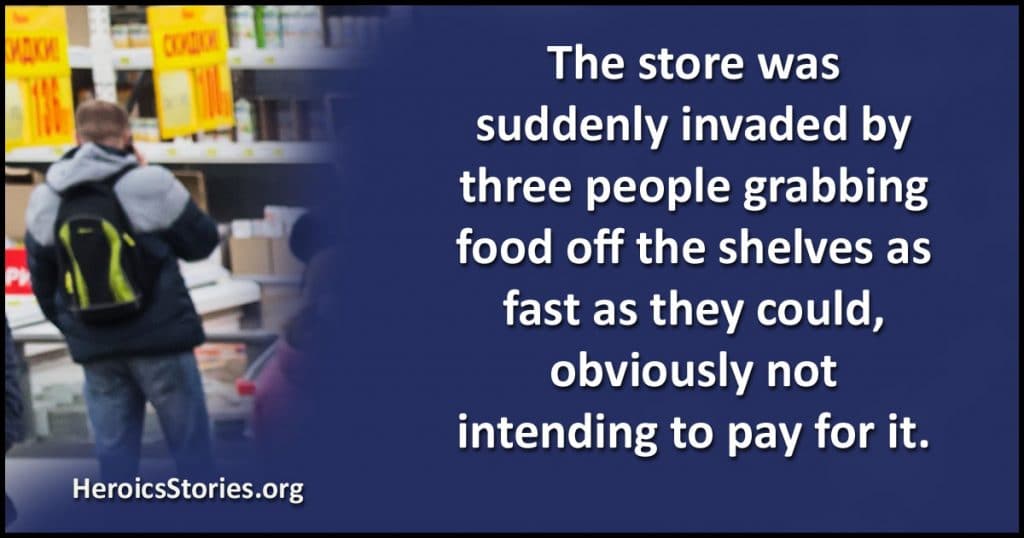by Loa Stewart
Bridgeport, California, USA

It’s a small gas station that has snacks, things to drink, cigarettes, and candy. The young man behind the counter wears boots, and a baggy t-shirt under his vest. He’s quick with a joke, knows his customers by name and what they normally want to buy. He treats children and adults with equal respect, but once decked a guy for slugging his wife right there in the store. He’s the kind of guy who will take a day off without pay in order to appear as a witness to a traffic accident. He reads science fiction or mysteries behind the counter when business is slow. And he’s my son.
One day, less than a week after the place had been broken into overnight, the store was suddenly invaded by three people grabbing food off the shelves as fast as they could, obviously not intending to pay for it. He hit the “panic button” and then went over the counter and locked the front door. It was obvious they were homeless, and equally obvious that they weren’t going anywhere with their ill-gotten gains. They dropped the loot and simply huddled together — knowing the police were on the way.
Imagine what they must have felt like when, instead of being cussed out or told they were headed for jail, they were told they didn’t have to steal if they were that hungry. “We have food in the back, expired but still safe to eat, that we plan on giving to a homeless shelter. If you need food, you can have some.”
They were told to pick up what they had dropped and put it back, then asked to straighten out the mess they’d made of the store. They were doing just that when the police arrived. The officers were told the situation was under control and the police were no longer necessary.
This wasn’t what they had expected. They were being treated as human beings who had screwed up but could right the wrong they’d done. Shocked, because they knew that the homeless were never welcome to use “public restrooms” in private businesses, they quickly followed orders to take turns and use the restroom to clean up.
Soon three cleaner people, standing just a bit taller than before when they came in, walked out with all the food their arms could hold. They were reminded that, if they needed to come back again, they were to ask and not just grab.
And then the young man went back to reading until the next customer came in. He would be the last person in the world to claim he was a hero. But that day, when it would have been so much easier just to hand three “bums” over to the cops and be done with it, he gave three people something they were in desperate need of — a small amount of self- respect and a little bit of hope.
Available in The Best of HeroicStories, Volume 1.
Podcast: Play in new window | Download (Duration: 3:58 — 5.0MB)


This young man must have had a good example to follow: the author, maybe?
In my old age, I have become sentimental, or is it emotional.
As a man of Chinese ancestry, we have been taught that a man would rather 流血不流淚 meaning we would shed (our) blood but not (our) tears.
(As an aside, in the Chinese language, where the grammatical subject is not specified, it is understood that the subject is “I/we” or “my/our” in the possessive case, depending on context. It is similar in the Japanese language. That is why I added in parentheses the word “our” so that non-Chinese speakers understand that it is not to shed other people’s blood.)
But this story of a very kind and understanding person for the underdog made me suddenly tear up.
Glad that I am subscribed to this Newsletter.